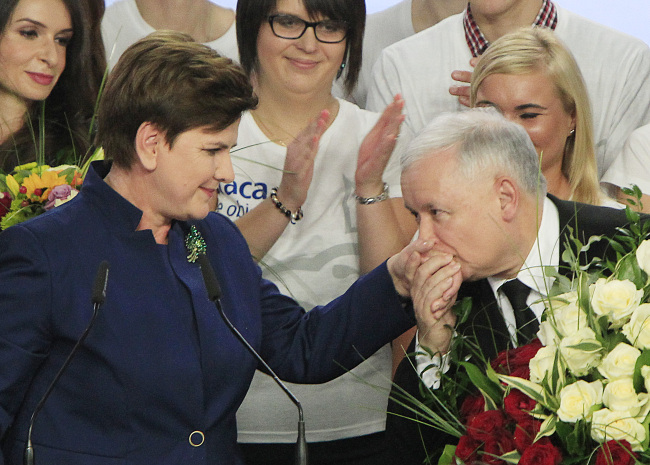[Newsmaker] Polish euroskeptic right scores landslide victory
By Korea HeraldPublished : Oct. 26, 2015 - 21:21
Poland’s conservative Law and Justice party won an outright majority in Sunday’s general election on anti-refugee rhetoric and welfare promises, ending eight years of centrist rule.
Analysts said the next government’s first moves would be closely scrutinized, given the risk that nationalist policies could inflame tensions with the European Union and Russia.
Analysts said the next government’s first moves would be closely scrutinized, given the risk that nationalist policies could inflame tensions with the European Union and Russia.

An exit poll by public broadcaster TVP showed the PiS, led by euroskeptic Jaroslaw Kaczynski, scored 242 out of 460 seats in the lower house of parliament, ousting the governing Civic Platform (PO) liberals who took 133 seats.
Kaczynski declared victory and his first step was to pay tribute to his twin brother, the late president Lech Kaczynski, who died in a 2010 plane crash in Smolensk, western Russia.
“Without him, we wouldn’t be here today. His spirit is stronger than his body. We must keep his memory alive,” Kaczynski said, also recalling 95 others who died in the crash.
“This is the first time in the history of Polish democracy that a single party has scored a(n) (outright) majority” in the Sejm, the lower house of parliament, he said.
Prime Minister Ewa Kopacz conceded the PO’s defeat after its two consecutive terms in office.
“The Poland we leave to the election winners” is one of economic and social progress, she told supporters in Warsaw.
Leftist parties were voted out of parliament for the first time since the advent of democracy after communism’s demise in 1989.
Turnout was 51.6 percent, a record high, according to the TVP exit poll.
Kaczynski, 66, did not run for prime minister but is expected to call the shots in the next government. He is seen as a master of political intrigue, pulling the strings behind the scene.
While he has yet to formally name the new premier, he previously anointed Beata Szydlo, 52, as the PiS’s choice after she ran a victorious presidential campaign for Andrzej Duda, a newcomer to politics who ousted PO ally Bronislaw Komorowski in May.
“After eight years in opposition, Kaczynski is making a big comeback,” Warsaw political analyst Eryk Mistewicz told AFP.
Poland has become an east European heavyweight after a quarter century of explosive growth and vastly improved living standards since communism fell.
But bread-and-butter issues coupled with fears sparked by Europe’s migrant crisis dominated the campaign.
Although the EU member’s economy is forecast to expand by 3.5 percent this year and next, and joblessness recently fell below 10 percent, many voters are fed up, believing time and money have been wasted.
The liberal PO also never recovered from a 2014 eavesdropping scandal that discredited high-profile government ministers, analysts say.
The departure last year of party leader Donald Tusk to the post of EU Council president set the centrists adrift.
Szydlo, 52, has pledged to lower the pension age, introduce generous family benefits, and impose taxes on banks and foreign-owned hypermarkets while cutting taxes for small and medium-sized enterprises.
Her populist-oriented promises targeted the core conservative electorate in the poorer, devoutly Catholic east and public sector workers.
But critics warn the moves could destabilize public finances, which are currently robust.
Kaczynski’s campaign preyed on fears arising from Europe’s worst migrant crisis since World War II.
He claimed refugees were bringing “cholera to the Greek islands, dysentery to Vienna, various types of parasites” ― comments that critics said recalled the Nazi era.
He insists Warsaw should financially support EU efforts to tackle the crisis, but not take in refugees ― a view shared by nearly 60 percent of Poles, surveys suggest.
The rightwing party last held power in 2005-7, when Kaczynski governed in tandem with his identical twin.
That era was marked with internal political turmoil, triggered by the Kaczynskis’ combative style and international tensions brought on by their anti-German and anti-Russian views as well as a row with the EU over Poland’s weighting in the bloc’s decision-making.
“We might now see a ‘Kaczynski 2.0’,” Mistewicz told AFP, signalling the PiS leader may tone down his politics.
“Rather than aggressively locking horns with the EU, he will look for ways to extract maximum benefit from it. With Russia, he may also forego confrontation in order to get back the Smolensk wreck.”
Analysts agree the PiS will still anchor Poland’s security policy in NATO and strong U.S. ties as a buffer against any threat from Russia.
It will seek ways to continue heavy reliance on coal at upcoming global climate talks, and joining the eurozone will remain a distant prospect.
But a PiS government is likely to reverse Kopacz’s decision to accept refugees under the EU quota plan.
Some warn Kaczynski’s return could relaunch a political dynamic possibly tinged with authoritarian overtones.
“If PiS end up governing alone with an allied president, Poland will become another Hungary,” Polish Academy of Sciences Professor Radoslaw Markowski told AFP. (AFP)
-
Articles by Korea Herald



![[Herald Interview] 'Amid aging population, Korea to invite more young professionals from overseas'](http://res.heraldm.com/phpwas/restmb_idxmake.php?idx=644&simg=/content/image/2024/04/24/20240424050844_0.jpg&u=20240424200058)













![[KH Explains] Korean shipbuilding stocks rally: Real growth or bubble?](http://res.heraldm.com/phpwas/restmb_idxmake.php?idx=652&simg=/content/image/2024/04/25/20240425050656_0.jpg&u=)

